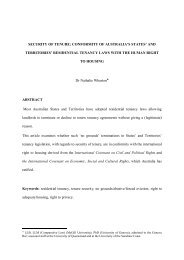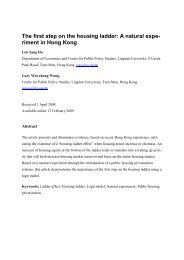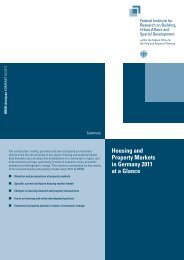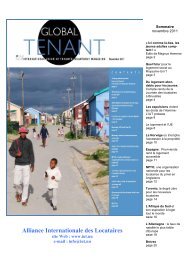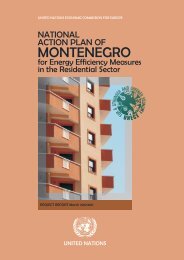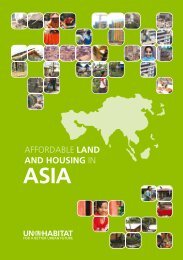housing developments in european countries - Department of ...
housing developments in european countries - Department of ...
housing developments in european countries - Department of ...
You also want an ePaper? Increase the reach of your titles
YUMPU automatically turns print PDFs into web optimized ePapers that Google loves.
Section 3<br />
Policies<br />
Policies Section 3<br />
Central Government authorities. In addition, a Climate<br />
Investment Programme has been <strong>in</strong>troduced for the<br />
period from 2003 to 2004, with associated fund<strong>in</strong>g <strong>of</strong><br />
materials such as timber. The Energy White Paper,<br />
published <strong>in</strong> February 2003, <strong>in</strong>cludes a commitment to<br />
<strong>in</strong>crease the energy efficiency <strong>of</strong> build<strong>in</strong>gs. In order to<br />
3.5 International and EU<br />
Developments<br />
Hous<strong>in</strong>g Focal Po<strong>in</strong>ts <strong>of</strong> many <strong>of</strong> the new EU member<br />
States to the survey on which this report is based. This<br />
issue is due to be discussed at the November 2004 EU<br />
almost SEK 850 million with the primary aim to<br />
decrease CO 2 emissions. A network consist<strong>in</strong>g <strong>of</strong> some<br />
40 organisations with<strong>in</strong> the field <strong>of</strong> build<strong>in</strong>g and<br />
property has devised a new plan <strong>of</strong> action entitled The<br />
Environmental Programme for the Build<strong>in</strong>g Sector<br />
which covers the period 2003-2010. The programme<br />
conta<strong>in</strong>s environmental goals for: energy conservation,<br />
economis<strong>in</strong>g with build<strong>in</strong>g materials, a gradual<br />
decrease <strong>of</strong> hazardous substances and encouragement<br />
<strong>of</strong> sound <strong>in</strong>door environments. A project entitled ‘The<br />
Build<strong>in</strong>g/Liv<strong>in</strong>g Dialogue for a Susta<strong>in</strong>able Build<strong>in</strong>g<br />
and Property Sector’ has been established which is a<br />
unique co-operation between private companies,<br />
municipalities and the Swedish Government. The result<br />
has been a voluntary agreement to undertake tangible<br />
measures for susta<strong>in</strong>able development and the project<br />
has three areas <strong>of</strong> priority: a healthy <strong>in</strong>door<br />
environment, effective use <strong>of</strong> energy and effective<br />
resource management. F<strong>in</strong>ally, all municipalities have<br />
special energy advisors and resources will be <strong>in</strong>vested<br />
<strong>in</strong> their further tra<strong>in</strong><strong>in</strong>g.<br />
A number <strong>of</strong> <strong>in</strong>itiatives have also been put <strong>in</strong> place <strong>in</strong><br />
the United K<strong>in</strong>gdom <strong>in</strong> recent years concern<strong>in</strong>g<br />
susta<strong>in</strong>able <strong>hous<strong>in</strong>g</strong> construction. For <strong>in</strong>stance, the UK<br />
Government is committed to <strong>in</strong>creas<strong>in</strong>g the standard to<br />
which all publicly funded <strong>hous<strong>in</strong>g</strong> is built, to ensure<br />
new <strong>hous<strong>in</strong>g</strong> is more susta<strong>in</strong>able. In England, all new<br />
social rented dwell<strong>in</strong>gs built by Registered Social<br />
Landlords are required to achieve an EcoHomes rat<strong>in</strong>g<br />
<strong>of</strong> ‘Pass’ as a m<strong>in</strong>imum essential condition for receipt<br />
<strong>of</strong> grant aid. Furthermore Registered Social Landlords<br />
are encouraged to aim for the higher ‘Good’ rat<strong>in</strong>g.<br />
Also <strong>in</strong> England, a high-level group <strong>of</strong> builders,<br />
developers, planners and environmental advisers has<br />
been appo<strong>in</strong>ted to spearhead efforts to raise the<br />
environmental quality <strong>of</strong> build<strong>in</strong>gs. This new<br />
Susta<strong>in</strong>able Build<strong>in</strong>gs Task Group will p<strong>in</strong>po<strong>in</strong>t ways<br />
<strong>in</strong> which <strong>in</strong>dustry and government can work together<br />
to promote susta<strong>in</strong>able development through better<br />
environmental performance <strong>in</strong> new and exist<strong>in</strong>g<br />
build<strong>in</strong>gs, and improve performance significantly on<br />
key issues <strong>in</strong>clud<strong>in</strong>g water, energy, waste and build<strong>in</strong>g<br />
achieve this the UK Government is currently<br />
undertak<strong>in</strong>g a comprehensive review <strong>of</strong> Build<strong>in</strong>g<br />
Regulation Part L (Conservation <strong>of</strong> Fuel and Power),<br />
which will be implemented <strong>in</strong> 2005. The EU Directive<br />
on Energy Performance <strong>of</strong> Build<strong>in</strong>gs is also be<strong>in</strong>g<br />
implemented accord<strong>in</strong>g to the same time-scale.<br />
The EU does not have competency <strong>in</strong> terms <strong>of</strong> <strong>hous<strong>in</strong>g</strong><br />
and as a result no explicit statement <strong>of</strong> EU <strong>hous<strong>in</strong>g</strong><br />
policy exists. However, <strong>developments</strong> at European level<br />
impact on the <strong>hous<strong>in</strong>g</strong> policies <strong>of</strong> the <strong>in</strong>dividual<br />
member States <strong>in</strong> a number <strong>of</strong> ways:<br />
Firstly, the EU directives that are aimed at harmonis<strong>in</strong>g<br />
legislation among member <strong>countries</strong>, and obligations<br />
by member <strong>countries</strong> to comply with fiscal, budgetary,<br />
taxation and expenditure regulations, directly affect<br />
the f<strong>in</strong>anc<strong>in</strong>g and operation <strong>of</strong> the <strong>hous<strong>in</strong>g</strong> sector.<br />
Secondly, EU regional development programmes can<br />
impact on local <strong>hous<strong>in</strong>g</strong> markets and thus shape local<br />
<strong>hous<strong>in</strong>g</strong> policies through the provision <strong>of</strong> <strong>in</strong>frastructure<br />
and <strong>in</strong>vestment that can support the demand for<br />
<strong>hous<strong>in</strong>g</strong> and, <strong>in</strong> certa<strong>in</strong> cases, distort regional<br />
development patterns and their associated <strong>hous<strong>in</strong>g</strong><br />
markets. Thirdly, specific and targeted EU <strong>in</strong>itiatives<br />
such as the URBAN programme, aimed at improv<strong>in</strong>g<br />
employment opportunities, support<strong>in</strong>g residents’<br />
participation and promot<strong>in</strong>g social <strong>in</strong>clusion <strong>in</strong><br />
deprived urban areas have augmented State-funded<br />
<strong>hous<strong>in</strong>g</strong> <strong>in</strong>itiatives by member <strong>countries</strong>.<br />
The European Commission has recently issued a<br />
number <strong>of</strong> directives relat<strong>in</strong>g to construction products,<br />
energy performance <strong>of</strong> build<strong>in</strong>gs, public procurement<br />
and competition. A number <strong>of</strong> <strong>countries</strong> are modify<strong>in</strong>g<br />
their legislation to conform to the energy performance<br />
directive and, specifically, construction products<br />
directives. Also a number <strong>of</strong> member <strong>countries</strong> have<br />
been the subject <strong>of</strong> legal action or compla<strong>in</strong>ts at EU<br />
level <strong>in</strong> relation to aspects <strong>of</strong> their <strong>hous<strong>in</strong>g</strong> policy.<br />
As was mentioned earlier <strong>in</strong> this section, many <strong>of</strong> the<br />
new EU member <strong>countries</strong> had to make major<br />
modifications to their exist<strong>in</strong>g legislation and policies<br />
<strong>in</strong> order to atta<strong>in</strong> EU membership and similar<br />
processes are currently underway <strong>in</strong> the applicant<br />
<strong>countries</strong> <strong>of</strong> Romania and Bulgaria. The possible<br />
extension <strong>of</strong> the Structural Funds to co-f<strong>in</strong>ance<br />
programmes address<strong>in</strong>g social <strong>hous<strong>in</strong>g</strong> and the<br />
modernisation <strong>of</strong> <strong>hous<strong>in</strong>g</strong> stock, particularly apartment<br />
build<strong>in</strong>gs constructed with prefabricated-panel<br />
technology, was also raised <strong>in</strong> the responses from the<br />
m<strong>in</strong>isterial conference ‘Comprehensive Modernisation<br />
<strong>of</strong> High-Rise (Panel) Build<strong>in</strong>gs and Renewal <strong>of</strong> the<br />
Surround<strong>in</strong>g Environment as a Long-Term Solution to<br />
Improv<strong>in</strong>g Hous<strong>in</strong>g Conditions’.<br />
In addition to EU <strong>in</strong>itiatives, some other <strong>in</strong>ternational<br />
<strong>developments</strong> have impacted on <strong>hous<strong>in</strong>g</strong> <strong>in</strong> the EU<br />
member States <strong>in</strong> recent years. For <strong>in</strong>stance, as was<br />
mentioned <strong>in</strong> Section 3.3 above, the Country Pr<strong>of</strong>iles<br />
on the Hous<strong>in</strong>g Sector which were written on several<br />
new EU member States by the UNECE have had a<br />
significant impact on <strong>hous<strong>in</strong>g</strong> policy <strong>in</strong> many <strong>of</strong> the<br />
<strong>countries</strong> <strong>in</strong> question, as has Guidel<strong>in</strong>es on<br />
Condom<strong>in</strong>ium Ownership <strong>of</strong> Hous<strong>in</strong>g for Countries <strong>in</strong><br />
Transition which was published by UNECE <strong>in</strong> 2003.<br />
The follow<strong>in</strong>g publications and conferences have also<br />
impacted on <strong>hous<strong>in</strong>g</strong> policy <strong>in</strong> the EU:<br />
■ World Hous<strong>in</strong>g Strategy (Vancouver World<br />
Conference, Habitat I, 1976);<br />
■ Agenda 21 and Rio Declaration (Rio World<br />
Conference, 1992);<br />
■ Istanbul Declaration (Habitat II, 1996);<br />
■ Millennium Declaration – Istanbul +5 (New York,<br />
2001), and<br />
■ the Johannesburg Declaration (World Summit for<br />
Susta<strong>in</strong>able Development, 2002).<br />
Full details <strong>of</strong> all the <strong>in</strong>ternational and EU<br />
<strong>developments</strong> that have impacted on <strong>hous<strong>in</strong>g</strong> <strong>in</strong> the 28<br />
<strong>countries</strong> are provided <strong>in</strong> TABLE 3.5.1.<br />
124 European Union Report<br />
Regular National Report on Hous<strong>in</strong>g Developments <strong>in</strong> European Countries<br />
125




